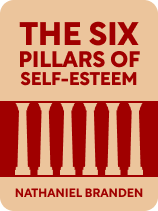

This article is an excerpt from the Shortform book guide to "The Six Pillars of Self-Esteem" by Nathaniel Branden. Shortform has the world's best summaries and analyses of books you should be reading.
Like this article? Sign up for a free trial here .
What does self-awareness have to do with self-esteem? How can living with self-awareness make you feel better about yourself?
Living with awareness improves your self-esteem by developing your self-efficacy: You react appropriately to your reality, so you make better decisions. With each good decision you make, you gather evidence that you’re capable—which increases your confidence that you’ll be capable in the future, and thus your self-esteem.
Keep reading to learn about the connection between self-awareness and self-esteem.
Why Living With Awareness Matters
According to psychotherapist and self-esteem expert Nathaniel Branden, there is an important connection between self-awareness and self-esteem. Specifically, self-awareness improves your self-efficacy, which is an important component of self-esteem. Every day, you make decisions that either do or don’t demonstrate a commitment to conscious living: You live with awareness by not buying a drink you can’t afford, then do the opposite by avoiding a necessary but tough conversation. Although you don’t consciously remember most of these decisions because you make so many of them, each decision either nurtures or chips away at your self-esteem—and, collectively, they determine your self-esteem.
Moreover, Branden contends that living without awareness can lead to addiction: You turn to addictive substances to reduce your awareness of your pain. But the tools of your addiction only blunt your pain temporarily. Afterward, your pain returns more powerfully than before—so you need even more of your substance to dull your awareness of it. Branden adds that addiction is only possible if you live without awareness: You only knowingly do something bad for you if you ignore the reality that it’s bad for you.
(Shortform note: Like Branden, psychologist Tara Brach contends that addiction is an attempt to escape pain. However, in Radical Acceptance, she argues that addiction stems primarily from an inability to accept yourself. As we’ll see, Branden also discusses the importance of accepting yourself but doesn’t directly link it to addiction.)
Exercises to Help You Live With Awareness
How can you live with greater awareness? Branden recommends sentence-completion exercises, which is a tool used in therapy and in psychological research. For two weeks, when you wake up, brainstorm six to 10 endings to prompts, or “sentence stems,” like the ones listed below. These endings don’t need to be unique or meaningful, just grammatically correct. Write quickly without self-editing, spending no more than 10 minutes on the exercise. (Shortform note: We’ve included a selection of Branden’s full list of sentence stems for this exercise. He has several more in his books, as well as on his Twitter feed.)
- To me, living consciously means…
- If I am a little more aware of my activities today…
- If I am more aware of how I relate to others today…
Don’t review your answers. When you finish, go about your day as normal. Then, each weekday evening, write six to 10 endings to sentence stems like the ones below.
- When I reflect on how I would feel if I lived more consciously …
- When I reflect on what happens when I am a little more aware of my activities …
- When I reflect on what happens when I am a little more aware of my relationships …
Don’t re-read any of your answers during the week, and don’t worry about repeating some answers. Each weekend, review your weekday writing and write at least six endings to the following prompt:
- If any of what I wrote this week is true, it would be helpful if I …
Branden contends that completing these exercises will naturally improve your self-esteem. He explains that we all have a well of knowledge we can’t immediately access. Completing these prompts allows us to tap into that well: Knowing you have to reflect each day on how greater awareness would improve your life increases how aware you are, improving your self-esteem.
Branden believes that once you complete the two-week program, you’ll have a solid understanding of how sentence completion works. You can then develop your own prompts to improve your consciousness in areas where you’re struggling with awareness.
| How Sentence-Completion Improves Your Self-Esteem Scholars theorize that doing sentence-completion exercises improves both your self-awareness and your self-responsibility—and since these are two pillars of self-esteem, this would explain why Branden believes that these exercises improve your self-esteem. First, psychologists contend that by doing sentence-completion exercises, you naturally gain a greater awareness of your inner psychic life, which may propel behavior change: The more aware you become of some behavior, the more motivated you become to improve that behavior, so the greater your likelihood of changing it. Second, psychologists argue that doing sentence-completion exercises encourages you to take responsibility—which, as we’ll learn later, is a pillar of self-esteem. They attribute this to the fact that the self-awareness you gain through your actions is a greater impetus for change than a therapist’s prodding. |

———End of Preview———
Like what you just read? Read the rest of the world's best book summary and analysis of Nathaniel Branden's "The Six Pillars of Self-Esteem" at Shortform .
Here's what you'll find in our full The Six Pillars of Self-Esteem summary :
- Exactly how to behave to improve your self-esteem
- Why you need to take responsibility for your life and actions
- Why so many self-esteem techniques don't work






